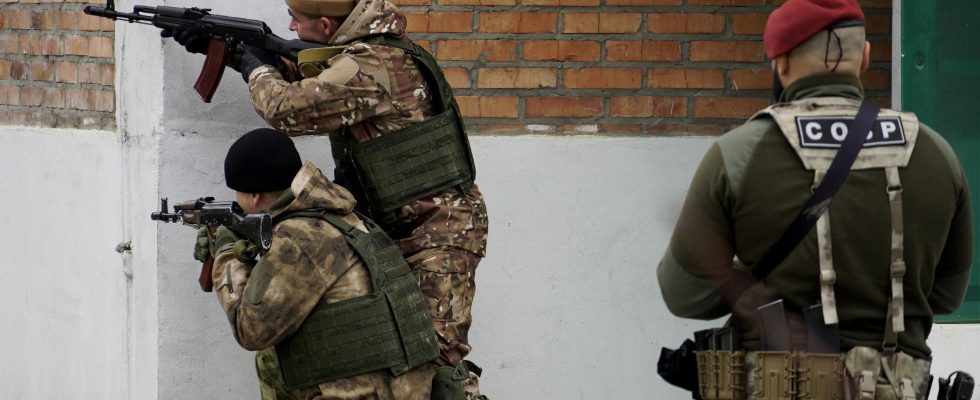Despite his youthful features, Tourpal’s gaze reveals years of suffering. The strabismus of this 24-year-old Chechen recalls his childhood spent in Grozny, under the Russian bombs. As a child, the breath of one of them touched his eye, which has remained motionless ever since. Even before the invasion of Ukraine, Moscow had sent its soldiers from 1994 to 1996 to quell the desire for independence of the small republic. Victorious, these Chechens were again attacked in 1999 by federal troops, led by the brand new president at the time… Vladimir Putin. “We lived 90% of the time in cellars, I grew up without seeing the sun”, remembers Tourpal.
If the Russian “anti-terrorist operation” is lifted in 2009, the repression continues. Came to power in 2005 after the assassination of his father Akhmad – who went over to the Russians during the second Chechen war – President Ramzan Kadyrov and his security forces hunt down real or supposed opponents. “House, family, job: everyone lived in a bubble to avoid problems,” says Tourpal. Until February 24, 2022, when Russia struck again. Nearly 29,000 Chechens have been sent to Ukraine since the start of the conflict, according to the dictator himself, including 13,000 volunteers. A high figure for a republic of barely 1.5 million inhabitants.
“Ordinary people are against war”
In October 2022, in the midst of a Russian mobilization campaign, Tourpal received a summons, he told The Express in a restaurant in Nice, where he took refuge. “The soldiers came to my house and said that I had to report to the military office a few days later. I was lucky because my friends, they just picked them up on the street. Since then, it is not known where they are. There is little chance that they are alive.” The following day, Tourpal and his wife left the country. Even if at the beginning of the invasion, some women demonstrated against the mobilization in Grozny, it remains very difficult to oppose in Chechnya. Enforced disappearances and arbitrary arrests are commonplace. “Ordinary people are against war,” Tourpal whispers.
The couple arrived in the European Union via Croatia in November 2022, with the aim of joining family in Angers. “I know I will never go home, even if the regime forces can torture my family and film videos of them asking me to come back,” breathes Tourpal, accompanied by his friend Mansour, 30. Settled in France for 12 years, this compatriot helped him to reach our country via Italy and to find refuge in Nice, like around thirty other Chechens since last summer. While his house was destroyed during the war, Mansour received a summons in February 2023 from his uncle who remained in Chechnya. “When Putin says to send ten soldiers, Kadyrov sends 100”, protests Mansour, who despite his hesitant French, insists on not speaking Russian. Because the Chechen leader, very dependent on Moscow, has a lot to gain from the fall of Wagner after the failed mutiny in June. On the one hand, Kadyrov cannot thin the ranks of his best soldiers who constitute the base of his power in Chechnya. On the other hand, he still had to satisfy the Tsar and to do so enlist conscripts.
It is difficult to say how many Chechens – out of the hundreds of thousands of Russians who fled the mobilization – left the country. But for example, out of 30 students who were in Mansour’s class at the University of Grozny ten years ago, ten fled Chechnya because of the mobilization, including seven in Europe. Four were sent to Ukraine. “There is a particularly large influx with the new mobilization methods, in particular the simplified online sending of summonses since April”, confirms Bérengère Savelieff of the Habitat Cité association, which specializes in helping Russian-speaking asylum seekers. . On July 20, the National Court for the Right of Asylum adopted new case law favorable to Russian deserters in France. “But they must present solid evidence”, nuances the volunteer, who deplores “a big difference in treatment between Chechens and Ukrainians.”
“The Russians won’t let us live in peace”
“Every week, we see young people fleeing the mobilization arriving in Nice, sometimes whole families”, explains Magamadov Ramzan, imam and president of the association of Chechens of the Alpes-Maritimes. Adam and Amina, a couple in their fifties, are among them. When their 25-year-old son returned home for the summer after his medical exams, soldiers came to give him a summons. The whole family – the parents and their son and two other small children – left the country via Turkey two days later. Arrived in Nice on July 16, they applied for asylum and have since been sleeping in a city park, for lack of accommodation.
“We have already survived two wars, we don’t need a third”, laments Amina who cannot hold back her tears, “I have my house, my job, why come here to become homeless… But the Russians won’t let us live in peace.” Her husband agrees: “They are totally destroying Ukraine, as they have done with us, and they want us to participate in this destruction? We don’t make children so that they become their cannon fodder!”
